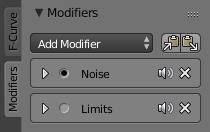F-Curve Modifiers¶
Reference
| Panel: |
|---|
F-Curve modifiers are similar to object modifiers, in that they add non-destructive effects, that can be adjusted at any time, and layered to create more complex effects.
Adding a Modifier¶

Modifiers panel.
The F-curve modifier panel is located in the Sidebar region. Select a curve by selecting one of its curve points, or by selecting the channel list. Click on the Add Modifier menu to select a modifier.
Types of Modifiers¶
Generator¶
Generator creates a Factorized or Expanded Polynomial function. These are basic mathematical formulas that represent lines, parabolas, and other more complex curves, depending on the values used.
- Additive
- This option causes the modifier to be added to the curve, instead of replacing it by default.
- Polynomial Order
Specify the order of the polynomial, or the highest power of
Xfor this polynomial. (Number of coefficients: 1.)Change the Coefficient values to change the shape of the curve.
Ver también
The Wikipedia Page for more information on polynomials.
Built-in Function¶
These are additional formulas, each with the same options to control their shape. Consult mathematics reference for more detailed information on each function:
- Sine
- Cosine
- Tangent
- Square Root
- Natural Logarithm
- Normalized Sine (
sin(x)/x)
- Amplitude
- Adjusts the Y scaling.
- Phase Multiplier
- Adjusts the X scaling.
- Phase Offset
- Adjusts the X offset.
- Value Offset
- Adjusts the Y offset.
Envelope¶
Allows you to adjust the overall shape of a curve with control points.
- Reference Value
- Set the Y value the envelope is centered around.
- Min
- Lower distance from Reference Value for
1:1default influence. - Max
- Upper distance from Reference Value for
1:1default influence. - Add Point
- Add a set of control points. They will be created at the current frame.
- Point
- Frame
- Set the frame number for the control point.
- Min
- Specifies the lower control point’s position.
- Max
- Specifies the upper control point’s position.
Cycles¶
Cycles allows you add cyclic motion to a curve that has two or more control points. The options can be set for before and after the curve.
- Cycle Mode
- Repeat Motion
- Repeats the curve data, while maintaining their values each cycle.
- Repeat with Offset
- Repeats the curve data, but offsets the value of the first point to the value of the last point each cycle.
- Repeat Mirrored
- Each cycle the curve data is flipped across the X axis.
- Before, After Cycles
- Set the number of times to cycle the data. A value of 0 cycles the data infinitely.
Trivially Cyclic Curves¶
When the Cycle Mode for both ends is set to either Repeat Motion or Repeat with Offset, and no other options of the modifier are changed from their defaults, it defines a simple infinite cycle.
This special case receives some additional support from other areas of Blender:
- Automatic Bézier handle placement is aware of the cycle and adjusts to achieve a smooth transition.
- The Cycle-Aware Keying option can be enabled to take the cycle into account when inserting new keyframes.
Noise¶
Modifies the curve with a noise formula. This is useful for creating subtle or extreme randomness to animated movements, like camera shake.
- Blend Type
- Replace
- Adds a -0.5 to 0.5 range noise function to the curve.
- Add
- Adds a 0 to 1 range noise function to the curve.
- Subtract
- Subtracts a 0 to 1 range noise function to the curve.
- Multiply
- Multiplies a 0 to 1 range noise function to the curve.
- Scale
- Adjust the overall size of the noise. Values further from 0 give less frequent noise.
- Strength
- Adjusts the Y scaling of the noise function.
- Offset
- Offsets the noise in time.
- Phase
- Adjusts the random seed of the noise.
- Depth
- Adjusts how detailed the noise function is.
Limits¶
Limit curve values to specified X and Y ranges.
- Minimum, Maximum X
- Cuts a curve off at these frames ranges, and sets their minimum value at those points.
- Minimum, Maximum Y
- Truncates the curve values to a range.
Stepped Interpolation¶
Gives the curve a stepped appearance by rounding values down within a certain range of frames.
- Step Size
- Specify the number of frames to hold each frame.
- Offset
- Reference number of frames before frames get held. Use to get hold for (1-3) vs (5-7) holding patterns.
- Use Start Frame
- Restrict modifier to only act before its «end» frame.
- Use End Frame
- Restrict modifier to only act after its «start» frame.